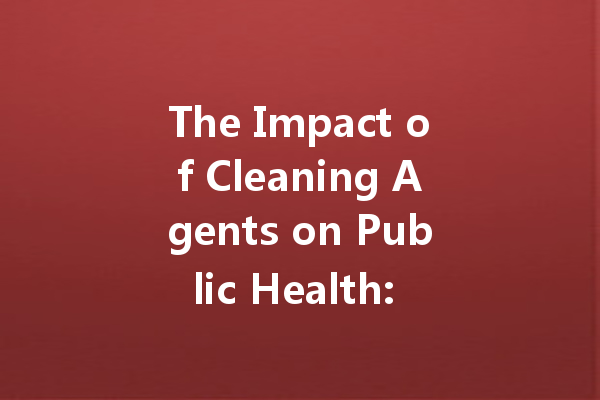Cleaning agents play a crucial role in maintaining hygiene and sanitation across various environments, from homes to healthcare facilities. As concerns for public health become increasingly paramount, understanding the impact of these agents and the responsibilities of manufacturers is essential. This article examines how cleaning agents affect public health and what manufacturers can do to ensure safety and efficacy.
Understanding Cleaning Agents
What Are Cleaning Agents?
Cleaning agents, also known as cleaning products, are substances designed to remove dirt, stains, and contaminants from surfaces. They typically contain a mixture of chemicals that work together to break down grime, disinfect surfaces, and provide a pleasing scent. Common types include detergents, disinfectants, solvents, and abrasives, each formulated for specific tasks.
The Role of Cleaning Agents in Public Health
The significance of cleaning agents in public health cannot be overstated. Effective cleaning mitigates the spread of pathogens, reduces allergens, and creates a healthier living and working environment. This is particularly critical in institutions like hospitals, schools, and restaurants, where a clean environment is essential for preventing illness outbreaks and ensuring safety.
Health Risks Associated with Cleaning Agents
Chemical Exposure
One of the primary concerns with cleaning agents is chemical exposure. Many cleaning products contain harsh chemicals that can cause skin irritation, respiratory issues, or more severe health effects if misused. Manufacturers carry the responsibility to formulate products with safety in mind, ensuring that harmful substances are minimized or eliminated.
Allergens and Irritants
Cleaning agents can also introduce allergens or irritants into the air, exacerbating conditions like asthma or allergies. People sensitive to specific ingredients may experience adverse reactions. Manufacturers can mitigate these risks by offering hypoallergenic or fragrance-free options, catering to sensitive populations.
The Manufacturer’s Responsibility
Formulating Safe Products

Manufacturers play a pivotal role in protecting public health through the formulation of safe cleaning agents. This involves rigorous testing of all ingredients to ensure that the final product meets health and safety standards. Investing in research and development is critical for creating innovative solutions that balance efficacy and safety.
Transparency in Labeling
Transparency is vital for consumer awareness. Proper labeling on cleaning agents should include clear instructions for safe usage, potential hazards, and ingredient lists. This information empowers consumers to make informed choices, avoiding products that may pose risks to their health.
Compliance with Regulations
Adhering to government regulations and safety standards is non-negotiable for manufacturers. Guidelines set forth by organizations such as the Environmental Protection Agency (EPA) in the United States dictate permissible ingredients and labeling requirements. Compliance is essential not only for legal adherence but also for fostering consumer trust.
Innovative Solutions for Safer Cleaning Agents
Green Chemistry
The rise of green chemistry offers a promising direction for cleaning agent manufacturers. By utilizing environmentally friendly materials and sustainable practices, manufacturers can create effective products that minimize health risks and environmental impact. This includes developing biodegradable agents and reducing reliance on harmful chemicals.
Consumer Education
Manufacturers can play a significant role in educating consumers about the correct use of cleaning agents. Workshops, informative labeling, and digital content can help consumers understand the importance of using products safely and effectively, ultimately leading to better health outcomes at home and in public settings.
Conclusion
The impact of cleaning agents on public health is substantial, with manufacturers holding significant responsibility for the safety and efficacy of their products. By prioritizing formulation safety, ensuring transparency, and adhering to regulations, manufacturers contribute positively to public health outcomes. As society continues to emphasize cleanliness and hygiene, the role of cleaning agents will only grow, making it imperative for manufacturers to adapt and innovate in their practices. Cleaner and safer products will foster healthier environments, ultimately benefiting public health on a broader scale.
